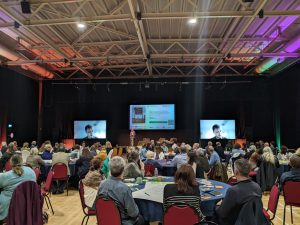The Scottish Rural & Islands Parliament returned for its fifth edition, with three days of discussions with communities across Scotland, hosted at the Nevis Centre in Fort William from November 1-3.
The Scottish Rural & Islands Parliament (SRIP) is an assembly that brings together individuals, community members, businesses, and organisations interested in rural and island Scotland.

Under the theme of Village Halls and Community Spaces, this year’s SRIP saw 350 delegates meet in person, with more than 100 online, exploring a range of relevant topics, including democracy and local governance, climate change, water resources, housing, childcare, rural cost of living, digital connectivity and youth perspectives.
“Discussions addressed the challenges and opportunities faced by rural and island communities, fostering a deeper understanding of the needs and aspirations of rural and island Scotland and linking these demands with policymakers and politicians,” a spokesperson said.
On the first day, the inaugural Scottish Rural & Islands Youth Parliament took place at the Caol Community Centre. This youth-focused event engaged individuals aged 16 to 30 in discussions relevant to them.
Joined by Highlands and Islands MSP, Emma Roddick, and Cabinet Secretary for Rural Affairs, Land Reform and Islands, Mairi Gougeon, youth delegates had an opportunity to work together on a range of topics, from housing to transport to food and agriculture, and put forward key demands they want decision-makers to act upon.
On November 2, delegates undertook study visits of the Lochaber area by bus, including Arisaig, Arkaig, Ballachulish, Glenfinnan, Kentallan and Duror, and Spean Bridge. In the evening, back at the Nevis Centre, local musicians played traditional music over dinner, with a ceilidh rallying everyone to the dance floor.
A panel debate on the future of rural and island Scotland then proceeded, welcoming to the stage the Deputy First Minister, Shona Robison, COSLA’s community wellbeing spokesperson, Councillor Maureen Chalmers, and Liam Glynn, Professor of General Practice at the University of Limerick.
Theona Morrison, chairperson of the coordinating group Scottish Rural Action, said: “Rural and island places make up 98 per cent of our country’s landmass. They are the locus of our natural assets, of our capacity to produce food and generate energy, and of a rich enterprising, cultural and linguistic tapestry.
“We made the most of this opportunity in Fort William to shine a light on the solutions that rural and island communities offer to global challenges.
“I was particularly excited about the inaugural Scottish Rural and Islands Youth Parliament. Over 75 young people from across Scotland joined together to identify clear actions they want to see to better secure their futures.”
The Scottish Islands Federation chairperson Camille Dressler said the federation was “delighted to welcome representation from more than 20 Scottish islands. From Orkney to Arran to Uist, each island has their unique challenges and ideas of how to progress.
“Through the SRIP, folk came together to amplify their voice, foster innovation and strengthen connections between communities, organisations and decision-makers. It was a great success – you could feel the energy and enthusiasm in the room.”
The insights and outcomes of the SRIP will directly influence the Scottish Government’s policy, a spokesperson added, making process, contributing to the development of the Rural Delivery Plan in 2026 and the National Islands Plan Review.
The outputs from all the sessions will also be taken on a roadshow in rural and island locations across Scotland in February 2024, “further extending the impact of the discussions and enriching the insights gathered at the parliament”.